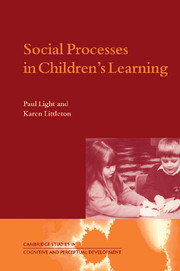Book contents
- Frontmatter
- Contents
- List of figures
- Preface
- Acknowledgements
- 1 Peer interaction and learning: perspectives and starting points
- 2 Peers and puzzles: a first series of studies
- 3 Computers and learning
- 4 Kings, Crowns and Honeybears: a second series of studies
- 5 Gender agendas
- 6 Social comparison and learning
- 7 Interaction and learning: rethinking the issues
- References
- Index
- Cambridge Studies in Cognitive and Perceptual Development
5 - Gender agendas
Published online by Cambridge University Press: 22 September 2009
- Frontmatter
- Contents
- List of figures
- Preface
- Acknowledgements
- 1 Peer interaction and learning: perspectives and starting points
- 2 Peers and puzzles: a first series of studies
- 3 Computers and learning
- 4 Kings, Crowns and Honeybears: a second series of studies
- 5 Gender agendas
- 6 Social comparison and learning
- 7 Interaction and learning: rethinking the issues
- References
- Index
- Cambridge Studies in Cognitive and Perceptual Development
Summary
Boys, girls and computers
Much of the research on peer interaction processes in learning originating in Piagetian and Vygotskian theories tends to be rather insensitive to the ‘non-cognitive’ characteristics of the individuals doing the learning. One characteristic of learners that has drawn some attention, however, is gender. This is especially true where the learning involves computers. Psychologists and educationalists alike are well aware of the danger that educational computer use might not just reflect, but actually amplify, pre-existing sex differences (Light, 1997; Littleton, 1995, Littleton and Bannert, in press).
Certainly girls often seem to be a good deal less enthusiastic about computer use than boys. Surveys suggest that more girls than boys have negative attitudes towards computers right across the school age range (Martin, 1991; Robertson, Calder, Fung, Jones and O'Shea, 1995; Todman and Dick, 1993, Whitley, 1997). A substantial proportion of both boys and girls seem to regard use of the computer as being more ‘appropriate’ for boys than for girls, and believe that boys like and use computers more than girls do (Hoyles, 1988; Hughes, Brackenridge and MacLeod, 1987; Wilder, Mackie and Cooper, 1985). Girls may hold to the view that ‘girls in general’ are just as computer competent as boys, while at the same time rating their own abilities lower than boys do (Shashaani, 1993).
- Type
- Chapter
- Information
- Social Processes in Children's Learning , pp. 52 - 72Publisher: Cambridge University PressPrint publication year: 2000

